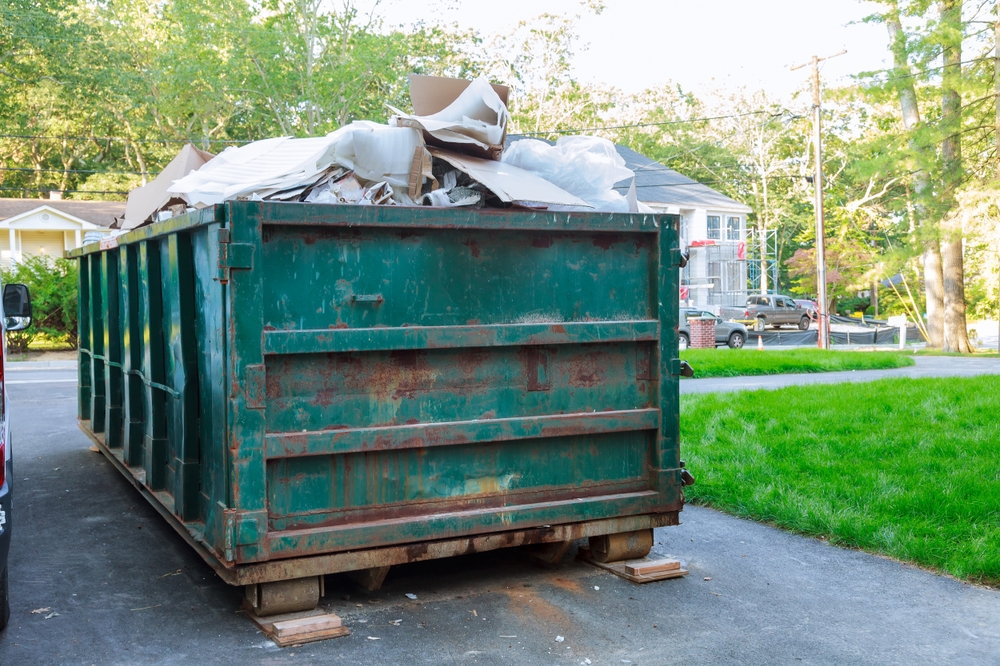June 14, 2024 - Benjamin Ehinger
Asphalt Recycling Near Me: Your Guide to Local Sustainable Pavement Solutions
CALL NOW 844-762-8449
Asphalt recycling is a process that rejuvenates aged asphalt pavements to be used in new pavement mixes. Recycling asphalt not only supports sustainable development by reducing material waste but also offers a cost-effective alternative to the traditional paving methods that utilize fresh asphalt. By participating in asphalt recycling, you are contributing to the conservation of non-renewable resources and reducing the ecological footprint of road construction.
Finding local asphalt recycling facilities has become more accessible with companies recognizing the environmental benefits and cost savings associated with this process. Depending on the location, these facilities may vary in services ranging from accepting old asphalt to selling recycled asphalt aggregates that can be used for various applications such as roadways, parking lots, and pathways. Whether you’re in Atlanta, GA, Nashville, TN, Orlando, FL, Dallas, TX, or Charlotte, NC, opportunities to recycle asphalt are available to meet the needs of both private and public sectors.
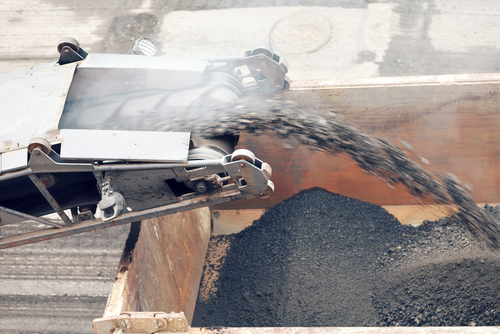 Asphalt recycling revitalizes used asphalt grindings into a new life, reducing waste in construction projects. This process is not only cost-effective but also environmentally friendly.
Asphalt recycling revitalizes used asphalt grindings into a new life, reducing waste in construction projects. This process is not only cost-effective but also environmentally friendly.
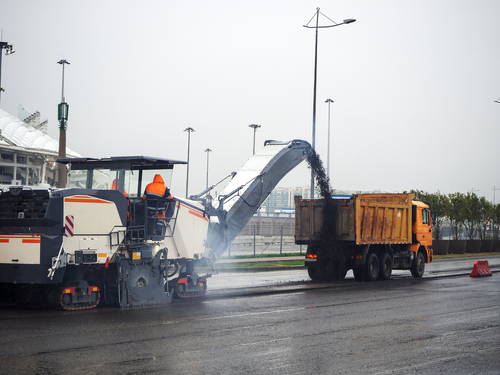 Recycled asphalt has found its way into numerous construction applications, proving to be a sustainable choice for roads and manufacturing new mixtures.
Recycled asphalt has found its way into numerous construction applications, proving to be a sustainable choice for roads and manufacturing new mixtures.
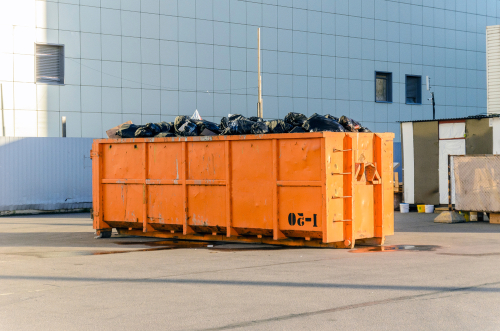 When considering asphalt recycling in Nashville, TN, there are several avenues you can explore. Asphalt, a valuable construction material recycling commodity, can be repurposed in various ways to minimize environmental impact and reduce costs.
Your first step is to find a local recycler. One such resource is R&R Paving, a Nashville-based company committed to sustainable practices in asphalt recycling. They’ve been an established partner in the area since 1989 and offer services to repurpose old asphalt for new projects.
Recycling Drop-off Sites in the city are another option. These are designated areas where materials like asphalt shingles can be taken. Nashville has a specific set of sites where you can drop off your recyclables. However, it’s crucial to contact them beforehand to verify if they accept asphalt.
Consider renting a concrete dumpster if you have a significant amount of asphalt to recycle. This method is particularly effective for large projects where you need to dispose of asphalt en masse. Such dumpsters are built to handle heavy materials like asphalt and can be hired from various local waste management services.
Should you be part of a project linked to the Federal Highway Administration (FHWA), recycling asphalt can form part of the required environmental considerations for roadway construction and maintenance. The FHWA supports the use of recycled asphalt to construct gabions and for other civil engineering applications.
Remember, asphalt can contain glass and other recyclables, which makes it an even more valuable construction material to recycle. By choosing to recycle your asphalt in Nashville, you’re contributing to a sustainable future and aiding in the conservation of natural resources.
When considering asphalt recycling in Nashville, TN, there are several avenues you can explore. Asphalt, a valuable construction material recycling commodity, can be repurposed in various ways to minimize environmental impact and reduce costs.
Your first step is to find a local recycler. One such resource is R&R Paving, a Nashville-based company committed to sustainable practices in asphalt recycling. They’ve been an established partner in the area since 1989 and offer services to repurpose old asphalt for new projects.
Recycling Drop-off Sites in the city are another option. These are designated areas where materials like asphalt shingles can be taken. Nashville has a specific set of sites where you can drop off your recyclables. However, it’s crucial to contact them beforehand to verify if they accept asphalt.
Consider renting a concrete dumpster if you have a significant amount of asphalt to recycle. This method is particularly effective for large projects where you need to dispose of asphalt en masse. Such dumpsters are built to handle heavy materials like asphalt and can be hired from various local waste management services.
Should you be part of a project linked to the Federal Highway Administration (FHWA), recycling asphalt can form part of the required environmental considerations for roadway construction and maintenance. The FHWA supports the use of recycled asphalt to construct gabions and for other civil engineering applications.
Remember, asphalt can contain glass and other recyclables, which makes it an even more valuable construction material to recycle. By choosing to recycle your asphalt in Nashville, you’re contributing to a sustainable future and aiding in the conservation of natural resources.
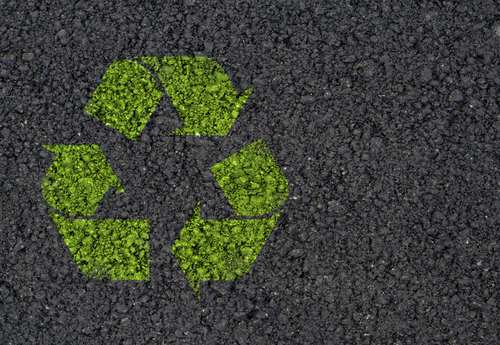 Recycling asphalt in Dallas, Texas, is a straightforward process that contributes to environmental conservation and can be cost-effective for your construction projects. In Dallas, you can recycle asphalt at specialized facilities that make use of the old material to produce new asphalt mixtures for roads and pavements, aligning with the initiatives of the Federal Highway Administration to promote the reuse of construction material.
Finding a Recycling Facility:
Recycling asphalt in Dallas, Texas, is a straightforward process that contributes to environmental conservation and can be cost-effective for your construction projects. In Dallas, you can recycle asphalt at specialized facilities that make use of the old material to produce new asphalt mixtures for roads and pavements, aligning with the initiatives of the Federal Highway Administration to promote the reuse of construction material.
Finding a Recycling Facility:
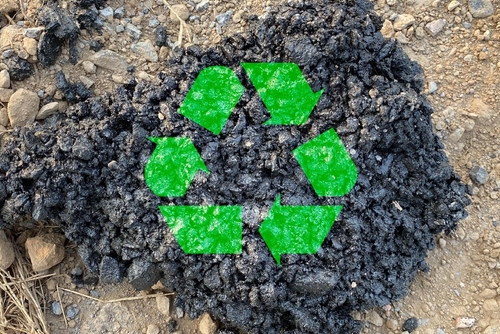 In Charlotte, NC, recycling your old asphalt materials is a straightforward process. Whether it’s from a residential project or commercial construction, you have multiple options to ensure your asphalt does not go to waste.
In Charlotte, NC, recycling your old asphalt materials is a straightforward process. Whether it’s from a residential project or commercial construction, you have multiple options to ensure your asphalt does not go to waste.
Key Takeaways
- Asphalt recycling is an eco-friendly alternative to using new materials in pavement projects.
- There are asphalt recycling facilities and services across many locations, such as Atlanta, GA, and Orlando, FL.
- Participating in asphalt recycling contributes to environmental conservation and cost-efficiency in construction projects.
Understanding Asphalt Recycling
Asphalt recycling isn’t just a buzzword; it’s a cost-effective approach that boasts significant environmental benefits. This section examines how old, damaged pavements are transformed into new roadways, saving both resources and energy.Basics of Asphalt Recycling
Asphalt recycling involves repurposing old or removed asphalt pavement by crushing it into an aggregate which can then be reused in new pavement. Here’s how the process typically works:- Milling: The top layer of asphalt is removed without disturbing the underlying base layer.
- Crushing: The collected asphalt is then crushed into a specific size of aggregate.
- Screening: After crushing, the aggregate is screened to remove any oversized materials.
- Additives: Sometimes, additives like asphalt emulsions or reclaimed oil are mixed in to enhance the quality of the recycled material.
Environmental Impact
Recycling asphalt reduces the environmental footprint by cutting down on quarrying, mining, and oil consumption, all necessary for producing new asphalt. Consider these benefits:- Lower Greenhouse Emissions: Less energy is required to produce recycled asphalt, leading to lower carbon emissions.
- Conservation of Natural Resources: Recycling conserves aggregates and bitumen, reducing the need for new petroleum extraction.
- Reduced Landfill Space Usage: By recycling old asphalt, you’re ensuring less waste material ends up in landfills.
Benefits of Asphalt Recycling
Asphalt recycling offers tangible economic benefits and significantly reduces the environmental impact by diverting waste from landfills.Economic Advantages
Asphalt recycling can be cost-effective for your budget and the economy. By reusing materials from an old pavement, you can reduce costs associated with new material procurement and transportation. According to the Cornell Local Roads Program, Cold-in-Place recycling can lower material costs as it utilizes the existing asphalt. Furthermore, the Federal Highway Administration supports recycling efforts, acknowledging the long-term savings in road maintenance and construction for communities.- In Atlanta, GA, recycled asphalt conserves local resources and lowers construction bills.
- Nashville, TN benefits from extended pavement life, offering long-term economic gains.
- In Orlando, FL, recycling reduces the need for expensive new asphalt production.
- Dallas, TX sees a dip in transportation costs by reusing nearby materials.
- Charlotte, NC uses recycling to mitigate the financial impact on local taxpayers.
Reduction in Landfills
Your contribution to asphalt recycling helps minimize the strain on local landfills. Instead of disposing of old asphalt, it gets a new life, which means less waste populating dumps. Asphalt materials that might end up in a landfill can be processed, thereby protecting the environment and freeing up valuable space for other refuse. As mentioned by U.S. Pave, recycling asphalt limits the need to harvest fresh aggregate, creating a cycle of usage that greatly reduces landfill accumulation over time.- Atlanta, GA sees a noticeable decrease in landfill use thanks to effective recycling.
- In Nashville, TN, recycling initiatives contribute to greener construction practices.
- Orlando, FL leverages recycling to complement its sustainability targets.
- Dallas, TX’s commitment to recycling assists in managing its landfill capacity.
- Charlotte, NC’s recycled asphalt initiatives ease the burden on local landfills.
Asphalt Recycling Processes
 Asphalt recycling revitalizes used asphalt grindings into a new life, reducing waste in construction projects. This process is not only cost-effective but also environmentally friendly.
Asphalt recycling revitalizes used asphalt grindings into a new life, reducing waste in construction projects. This process is not only cost-effective but also environmentally friendly.
Cold Milling
Cold milling involves removing the top layers of an existing pavement, usually known as asphalt grindings, without heating. This method is highly versatile as it allows for precise removal at various depths, widths, or slopes. In cities like Atlanta, GA, and Charlotte, NC, this process efficiently clears the way for new layers of asphalt, enabling a smooth recycle asphalt transition, ideal for municipal roadways and commercial parking lots.- Location Availability:
- Atlanta, GA: Yes
- Charlotte, NC: Yes
- Others: Variable
Hot Recycling
Hot recycling is a process where your collected asphalt grindings are combined with new materials and heated. It’s a common technique for larger-scale construction projects in cities such as Nashville, TN, and Dallas, TX. The recycled material is then mixed with virgin aggregate and asphalt binder to produce a hot mix asphalt that is good as new.- Advantages:
- Energy Efficient: Reduces need for new materials.
- Quality: Comparable to new asphalt mixes.
Full-Depth Reclamation
In this process, the entire thickness of the asphalt pavement is recycled. Used frequently in Orlando, FL, full-depth reclamation strengthens the foundation by blending the old asphalt layers with the underlying base materials. This technique is cost-efficient and environmentally beneficial as it eliminates the need to haul away old materials.- Process Steps:
- Pulverizing: Old pavement is ground and mixed with base.
- Stabilizing: Additives like cement or foamed asphalt create a strong base.
Finding Asphalt Recycling Locations
Locating a facility for asphalt recycling is straightforward with the proper guidance on available services and understanding the necessary steps for drop-off.Local Services
- Atlanta, GA: Visit the ShingleRecycling.org website to find a recycler in Atlanta, or use your zip code for a more precise search.
- Nashville, TN: In Nashville, your local solid waste management district can direct you to private companies that accept asphalt.
- Orlando, FL: Check with the local landfills or transfer stations, as some may offer recycling options. However, dedicated asphalt recycling centers will be a more efficient choice.
- Dallas, TX: Dallas residents can utilize both public and private facilities, ensuring easy access to asphalt and concrete recycling.
- Charlotte, NC: You can find specific recycling programs and centers through statewide environmental initiatives or online directories of recyclers.
Drop-Off Procedures
When planning to drop off your asphalt materials:- Contact the facility in advance to verify operating hours and any fees associated.
- Prepare materials according to the recycler’s guidelines, ensuring they are free of contaminants.
- Follow the drop-off instructions provided by the facility, which may include sorting materials or completing forms upon arrival.
Preparation for Asphalt Recycling
Before recycling your asphalt, you’ll need to ensure it is free from contaminants and reliably transported to the recycling facility.Sorting and Cleaning
Your first step is to sort and clean the asphalt. Remove any debris like glass, plastic, or metal. The purity of the clean asphalt is crucial for quality recycled material. In locations like Atlanta, GA, and Charlotte, NC, where there is significant construction and renovation activity, facilities often have stringent guidelines for the cleanliness of asphalt for recycling. Here, specialized equipment might be available to assist in the cleaning process.- Atlanta, GA: Facilities may offer debris filtering services.
- Charlotte, NC: Some locations provide onsite sorting assistance.
Transportation Considerations
Once the asphalt is clean, consider how you will transport it to the recycling facility. Use trailers suited to the material’s weight and bulk. Ensure that the chosen transport method complies with local regulations regarding asphalt dumping and transportation.- Nashville, TN: Determine if local ordinances affect trailer usage.
- Orlando, FL: Check for temperature considerations that might affect transport.
- Dallas, TX: Assess the route for any weight-restricted roads that could impact your ability to transport large amounts of material.
Applications of Recycled Asphalt
 Recycled asphalt has found its way into numerous construction applications, proving to be a sustainable choice for roads and manufacturing new mixtures.
Recycled asphalt has found its way into numerous construction applications, proving to be a sustainable choice for roads and manufacturing new mixtures.
Road Construction and Paving
In cities like Atlanta, GA and Charlotte, NC, recycled asphalt is extensively used for road construction and paving. By incorporating asphalt & concrete recycling, the aggregate component of old roads is rejuvenated and transformed into a new pavement material. This not only conserves natural resources but also reduces construction costs. When you drive on roads in these areas, you’re likely traveling on surfaces made from recycled materials.- Nashville, TN is known for using recycled asphalt in their road repair and paving projects, reducing the environmental footprint of construction.
- Orlando, FL prioritizes sustainable road construction, adopting recycled asphalt in roadway development.
Manufacturing of New Asphalt
Recycled asphalt isn’t just for laying down new roads; it’s also a critical aggregate component for the manufacturer of new asphalt mixtures. In Dallas, TX, companies specialize in the production of these eco-friendly mixtures, ensuring that the quality of the new asphalt meets strict standards.- In Atlanta, GA, manufacturers of new asphalt utilize recycled materials to create high-quality asphalt that is both durable and sustainable.
- Charlotte, NC boasts modern facilities where recycled asphalt is processed and remixed for various construction applications.
Materials Related to Asphalt Recycling
When considering recycling your asphalt and concrete waste, knowing how to dispose of the materials and the benefits of using recycled materials are essential.Concrete and Asphalt Disposal
You can responsibly dispose of your broken concrete and asphalt at facilities geared towards recycling these materials. In cities like Atlanta, GA or Orlando, FL, specific plants and services exist to take in these aggregates. They ensure that your asphalt and concrete disposal meets environmental standards by repurposing them for new construction uses, thus reducing waste in landfills.- Dallas, TX: Providers may charge a fee and have certain requirements for drop-off.
- Nashville, TN: Some locations may offer pick-up services for large quantities of waste.
- Asphalt pavement
- Broken concrete
- Asphalt shingles
Utilization of Recycled Materials
Recycled materials from asphalt and concrete can be incredibly valuable in new construction projects. The recycling process uses less energy, resulting in reduced carbon emissions. For instance, the reclaimed asphalt pavement (RAP) is often used in new mixes, with a high percentage being sourced from old pavements. Recycled Asphalt Shingles (RAS) provide another example. Not only do they reduce the ecological footprint, but they also help conserve natural resources. Here are ways these materials are reincorporated:- Base material for new roadway or pavement projects
- Aggregate for concrete mixtures
- Atlanta, GA and Charlotte, NC: High availability of RAP in new pavement mixes
- Orlando, FL: Use of recycled materials in public works is encouraged
- Dallas, TX and Nashville, TN: Local markets may affect the demand and supply dynamics of recycled aggregates
Regulations and Standards in Recycling
When you’re considering asphalt recycling in cities like Atlanta, GA, Nashville, TN, Orlando, FL, Dallas, TX, and Charlotte, NC, understanding the local regulations and standards is imperative. Each state and locality can have different requirements and standards for recycling asphalt and other construction materials.- Federal Highway Administration (FHWA): The FHWA supports the use of recycled materials in highway construction. Through their oversight, standards ensure that recycled asphalt meets safety and performance criteria, making it a reliable material for road construction and rehabilitation efforts.
- Construction material recycling: When recycling asphalt, environmental regulations must be followed. This includes proper handling of materials to prevent contamination and adherence to standards that allow the material to be repurposed as road aggregate, in new asphalt mixtures, or even as fill material in gabions.
- Gabions: While not directly related to asphalt, gabions are an example of how recycled materials can be utilized in construction. The mesh cages are often filled with rock or concrete rubble, which can include recycled construction material.
- Glass: In some areas, recycled glass is used in asphalt production, which requires following specific guidelines to ensure the material is processed and incorporated correctly. This innovative use of recycled glass also demands adherence to quality and safety standards set forth by local and state authorities.
How to Recycle Asphalt in Nashville, TN
 When considering asphalt recycling in Nashville, TN, there are several avenues you can explore. Asphalt, a valuable construction material recycling commodity, can be repurposed in various ways to minimize environmental impact and reduce costs.
Your first step is to find a local recycler. One such resource is R&R Paving, a Nashville-based company committed to sustainable practices in asphalt recycling. They’ve been an established partner in the area since 1989 and offer services to repurpose old asphalt for new projects.
Recycling Drop-off Sites in the city are another option. These are designated areas where materials like asphalt shingles can be taken. Nashville has a specific set of sites where you can drop off your recyclables. However, it’s crucial to contact them beforehand to verify if they accept asphalt.
Consider renting a concrete dumpster if you have a significant amount of asphalt to recycle. This method is particularly effective for large projects where you need to dispose of asphalt en masse. Such dumpsters are built to handle heavy materials like asphalt and can be hired from various local waste management services.
Should you be part of a project linked to the Federal Highway Administration (FHWA), recycling asphalt can form part of the required environmental considerations for roadway construction and maintenance. The FHWA supports the use of recycled asphalt to construct gabions and for other civil engineering applications.
Remember, asphalt can contain glass and other recyclables, which makes it an even more valuable construction material to recycle. By choosing to recycle your asphalt in Nashville, you’re contributing to a sustainable future and aiding in the conservation of natural resources.
When considering asphalt recycling in Nashville, TN, there are several avenues you can explore. Asphalt, a valuable construction material recycling commodity, can be repurposed in various ways to minimize environmental impact and reduce costs.
Your first step is to find a local recycler. One such resource is R&R Paving, a Nashville-based company committed to sustainable practices in asphalt recycling. They’ve been an established partner in the area since 1989 and offer services to repurpose old asphalt for new projects.
Recycling Drop-off Sites in the city are another option. These are designated areas where materials like asphalt shingles can be taken. Nashville has a specific set of sites where you can drop off your recyclables. However, it’s crucial to contact them beforehand to verify if they accept asphalt.
Consider renting a concrete dumpster if you have a significant amount of asphalt to recycle. This method is particularly effective for large projects where you need to dispose of asphalt en masse. Such dumpsters are built to handle heavy materials like asphalt and can be hired from various local waste management services.
Should you be part of a project linked to the Federal Highway Administration (FHWA), recycling asphalt can form part of the required environmental considerations for roadway construction and maintenance. The FHWA supports the use of recycled asphalt to construct gabions and for other civil engineering applications.
Remember, asphalt can contain glass and other recyclables, which makes it an even more valuable construction material to recycle. By choosing to recycle your asphalt in Nashville, you’re contributing to a sustainable future and aiding in the conservation of natural resources.
How to Recycle Asphalt in Atlanta, GA
In Atlanta, GA, recycling asphalt is a process you can engage in to contribute to environmental sustainability and potentially save on construction costs. The Federal Highway Administration advocates for the use of recycled materials in highway construction, and asphalt is no exception. When you have asphalt for recycling, consider contacting a facility like 81 Earth Recycling. They specialize in asphalt recycling, a service that benefits not just roadways but also infrastructure projects that might utilize recycled materials in gabions or as bases for new constructions. For larger projects, renting a concrete dumpster in Atlanta, GA can facilitate the transport and recycling of your asphalt material. It’s an efficient way to manage the logistics of asphalt disposal and recycling, supporting a streamlined approach to material management. If you’re dealing with construction material recycling, facilities like Metro Green in Atlanta process construction and demolition debris. By opting for centers like these, you’re choosing companies that maintain a commitment to reusing materials and preventing unnecessary landfill expansion. Remember, glass can often be recycled alongside construction materials. While not directly related to asphalt recycling, keeping in mind a facility’s capability to handle multiple recyclables can be beneficial for comprehensive waste management. Before you decide on a recycling solution, verify that the center you choose complies with the recycling regulations and standards set out by authorities. This ensures that the materials are recycled properly and can be repurposed safely and effectively.How to Recycle Asphalt in Dallas, TX
 Recycling asphalt in Dallas, Texas, is a straightforward process that contributes to environmental conservation and can be cost-effective for your construction projects. In Dallas, you can recycle asphalt at specialized facilities that make use of the old material to produce new asphalt mixtures for roads and pavements, aligning with the initiatives of the Federal Highway Administration to promote the reuse of construction material.
Finding a Recycling Facility:
Recycling asphalt in Dallas, Texas, is a straightforward process that contributes to environmental conservation and can be cost-effective for your construction projects. In Dallas, you can recycle asphalt at specialized facilities that make use of the old material to produce new asphalt mixtures for roads and pavements, aligning with the initiatives of the Federal Highway Administration to promote the reuse of construction material.
Finding a Recycling Facility:
- Research recycling centers in the Dallas area that accept used asphalt.
- Facilities like Texas Disposal Systems provide services for asphalt and concrete recycling.
- Ensure the chosen recycler meets EPA and state guidelines for asphalt recycling.
- Separate asphalt from other construction debris.
- Consider using a concrete dumpster rental in Dallas, TX for easy transport and disposal.
- Crush the material if required by the recycling center.
- Utilize RAP for new construction or road repair projects.
- RAP can be used to create gabions for erosion control or retaining walls.
- Some facilities may also incorporate glass into the recycled mixture to enhance durability.
- Recycling asphalt saves natural resources and reduces landfill waste.
- It may reduce the cost of your project and contribute to LEED points.
How to Recycle Asphalt in Orlando, FL
Recycling asphalt is a sustainable practice that conserves natural resources and reduces waste in landfills. In Orlando, FL, you have several options to recycle your asphalt materials effectively. Find a Local Recycler There are dedicated facilities in Orlando that specialize in collecting and recycling construction material, including asphalt. These facilities process asphalt to be reused in various applications, such as new road construction and gabions. Research recyclers to find out their specifications for accepting materials. Concrete Dumpster Rental For larger projects, consider renting a concrete dumpster that is suitable for disposing of asphalt. This allows for an efficient way to handle large quantities and the dumpster service in Orlando, FL will ensure that the material is sent to the right recycling facility. Contact Federal Agencies The Federal Highway Administration encourages the recycling of construction materials, including asphalt. You can contact them for guidelines and additional resources on the best practices for recycling asphalt. Consider Material Reuse Before recycling, consider if your asphalt debris can be repurposed. Crushed asphalt can be used as a base or subbase for new pavements, as filler material, or in the creation of new asphalt mixtures. Remember to confirm that the recycler or service handles the type of asphalt debris you have. By actively participating in asphalt recycling, you contribute to a more sustainable environment by reducing the ecological footprint associated with construction waste.How to Recycle Asphalt in Charlotte, NC
 In Charlotte, NC, recycling your old asphalt materials is a straightforward process. Whether it’s from a residential project or commercial construction, you have multiple options to ensure your asphalt does not go to waste.
In Charlotte, NC, recycling your old asphalt materials is a straightforward process. Whether it’s from a residential project or commercial construction, you have multiple options to ensure your asphalt does not go to waste.
- Full-Service Drop-Off Recycling Centers: Mecklenburg County Solid Waste and Recycling accepts construction and demolition debris including asphalt at its full-service drop-off centers. Loads up to 10 cubic yards are accepted, making it suitable for most projects.
- Private Recyclers: For larger quantities, companies like Blythe Construction Inc. offer recycling services in the Charlotte area. You can find their contact information in the University of North Carolina at Charlotte’s recycler list.
- Concrete Dumpster Rental: When undertaking a project, consider renting a concrete dumpster in Charlotte, NC specifically for asphalt and concrete waste. This simplifies the process of collecting and transporting the material to the appropriate recycling facility.
- Recycled Asphalt for Gabions or Glass: Recycled materials can be repurposed in various ways. For example, crushed asphalt can be used to fill gabions for landscaping or construction purposes. Additionally, recycling facilities may process asphalt shingles to recover glass fibers for reuse.
Frequently Asked Questions
Recycling asphalt and other construction materials is an essential part of sustainable development. Below are common inquiries about recycling services, including the disposal of asphalt and concrete, which can often be managed conveniently near urban areas such as Atlanta, Nashville, Orlando, Dallas, and Charlotte.Where can I find asphalt disposal options nearby?
In cities like Atlanta, GA, and Dallas, TX, you can seek out local waste management facilities specializing in asphalt recycling. If you want to find specific locations where you can drop off asphalt materials, check out services such as Rock Crush Recycling which offer detailed information on the process and locations.How can I recycle asphalt for free in my area?
Some municipalities may offer free recycling programs for residents. In areas like Orlando, FL, and Nashville, TN, check with your local waste management department to see if they provide free asphalt recycling services or events.What are the available facilities for brick and concrete recycling close to me?
For brick and concrete recycling, you’ll find that certain construction and demolition recycling centers are equipped to handle these materials. In Charlotte, NC, for instance, you can find dedicated facilities by searching online or contacting local construction companies which often have knowledge of recycling facilities.Which landfills accept concrete chunks near my location?
Not all landfills are suited to accept concrete chunks because of the additional requirements for processing heavy materials. Specific to locations like Nashville, TN, and Atlanta, GA, certain landfills have dedicated areas for concrete disposal, which are then recycled or repurposed.Can old asphalt driveways be recycled, and if so, how?
Yes, old asphalt driveways can be recycled. The process typically involves removing the asphalt, crushing, and screening it to produce reclaimed asphalt pavement (RAP), which is then used in creating new asphalt mixes. Companies in cities like Dallas, TX, and Charlotte, NC, specialize in these services.What are the differences in durability between recycled asphalt and new asphalt?
Recycled asphalt’s durability closely matches that of new asphalt, with many studies suggesting comparable performance. The use of RAP in new mixtures contributes to sustainability and can help conserve natural resources. For nuanced details on durability comparisons, The National Asphalt Pavement Association offers comprehensive resources.RECENT BLOGS
Our Reviews
glenda prowell
1719242299
Louiner made it easy to make arrangements to have a dumpster put in my driveway. He was able to answer all my questions and made the entire process simple.
Glenda Lanier Prowell
1719241850
I have ordered an 11 yard dumpster to be delivered to my house.Lonier was extremely helpful and answered all my questions. The rate was very reasonable.
debbie Craton
1718740650
Heather was SUPER friendly and worked with me to get me whst I needed.I am very glad I called Waste Removal
adorna hayward
1718635411
Very pleasant to work with. Makes you want to call her back specifically.
Alvin Laws
1718397329
Always answers. Very responsive and follows the guidelines we have requested about where our receptacle sits.


